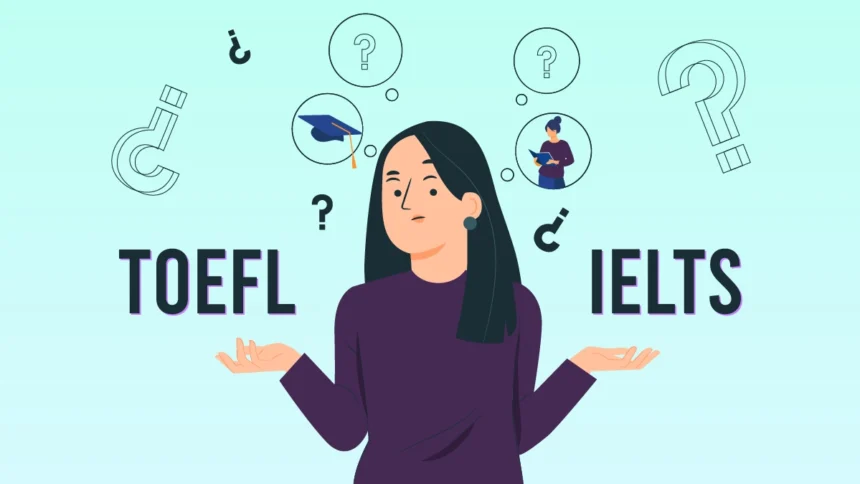If you aim to pursue higher studies abroad, TOEFL and IELTS perhaps ring a bell. Right?
IELTS and TOEFL play an integral role in assessing English proficiency for individuals who dream of pursuing higher studies in an English-speaking country, like the US, Canada, UK, and others. However, their significance goes way beyond academia and is also incredibly beneficial for professionals looking for career advancements abroad.
Excellent scores in these standardised tests facilitate seamless access to remarkable educational institutions and brilliant career opportunities. But, navigating the pros and cons is significant, given their diverse structures and evaluation criteria. If you are baffled about which of these should be perfect for you, consult a reputed IELTS or TOEFL coaching online website like AbroAdvice.com.
You can also choose to go through this comprehensive guide till the end. Here, we will walk you through the relevance and differences between TOEFL and IELTS. Regardless of whether you’re a potential student or professional seeking career prospects, going through this post will surely put you miles ahead.
Let’s get started!
TOEFL and IELTS: What’s the Difference?
If the words of eminent study abroad consultants of reputed education consulting websites like AbroAdvice.com are anything to go by, both TOEFL and IELTS are exams that prove your English language proficiency. They are two of the most popular and widely used tests for doing this.
Both have a high degree of credibility and recognition by top educational institutions. They aim to evaluate an individual’s English by assessing reading, speaking, writing, and listening skills.
- TOEFL – It denotes the Test of English as a Foreign Language, and it is an English language proficiency test designed by the US-based Education Testing Service. 9 out of 10 universities in the US prefer it. That said, more than 11,000 colleges in more than 150 countries accept it too. It’s also accepted by 100% of UK universities and some in Australia, Canada, and New Zealand.
- IELTS – This stands for the International English Language Testing System. It is an exam owned and managed by Cambridge Examinations, IDP Australia, and the British Council. It is recognised for entrance to universities and colleges across the English-speaking world, including 100% of universities in the UK and Australia. It is also accepted by more than 3400 institutions in the US.
Now, let’s examine the critical differences between IELTS and TOEFL. Which one should you take if you aim to demonstrate your English capability?
- Scope
While both TOEFL and IELTS are remarkable tests to assess students’ language proficiency and suitability for specific programs and countries, IELTS has a wider application. It extends its reach beyond educational purposes, serving as a proficiency test for occupational endeavours and immigration to English-native countries.
However, TOEFL is mainly geared towards academic endeavours. While it is recognised as a language skills test for immigration in New Zealand and Australia, its key use remains among pupils, offering evidence of language proficiency for academic purposes.
- Location
While both exams are widely accessible, they hugely vary in aspects of availability. The IELTS is offered in more than 140 countries, offering testing facilities at 1600 locations worldwide, on average.
On the contrary., TOEFL enable students to take the test from almost any corner of the world. With testing centres spread across more than 170 countries and 6000+ locations, the test offers extensive accessibility. Furthermore, for those availing of the TOEFL iBT Home Edition, the exam can be scheduled 24 hours a day on four weekdays, further increasing flexibility.
- Scoring
The key difference between IELTS and TOEFL lies in their scoring systems. IELTS uses a band system ranging from 1 (the lowest) to 9 (the highest). The overall IELTS score, as well as scores for individual segments, are evaluated on this scale of 0 to 9.
On the contrary, TOEFL scored a total of 120 points. Every segment – reading, listening, speaking, and writing is graded on a scale of 0 to 30, contributing to the overall TOEFL score.
- Duration of the Test
The duration of the TOEFL iBT (internet-based test) is 2 hours. In the case of the paper edition of the TOEFL, the duration extends to 3 hours. However, the IELTS exam is only for 2 hours and 45 minutes. These variations in test durations offer candidates crucial insights into the time dedication needed for every test format.
- Frequency
The TOEFL iBT test offers flexibility with a schedule that spans over 60 sessions every year at authorised test centres across the world. In different cities, the exam is available five days a week. The TOEFL iBT Home Edition offers even more convenience. This allows conducting tests four days every week with the added perk of scheduling at any time throughout the day.
On the contrary, the IELTS enables a weekly testing frequency. With exam dates available on 48 days every year, applicants have ample chances to schedule their IELTS easily, offering a balance between regular availability and exam flexibility.
- Declaration of Results
Applicants can typically access their TOEFL scores within a relatively short duration of 4-6 days from the exam date. On the contrary, IELTS exam results are released almost instantly. The online results become available within a week, while offline results received through traditional mail may take up to 13 days after completing the test.
Wrapping Up,
The choice between TOEFL and IELTS depends on various crucial aspects. It can be hugely influenced by personal preferences, like comfort levels or the specific needs of one’s academic or professional objectives.
Applicants generally prefer TOEFL if they want to take a fully computer-based test without direct examiner interaction. However, IELTS tends to be favoured by individuals who are pursuing educational, occupational, or immigration objectives in English-speaking countries.
If you prefer MCQ and can comprehend an American accent efficiently, the TOEFL is perfectly suited for you. If you love writing with a pen and prefer a variety of different question types, then the IELTS is perfect for you. Here’s wishing you good luck in making an informed decision and scoring high in whichever test you opt for!






